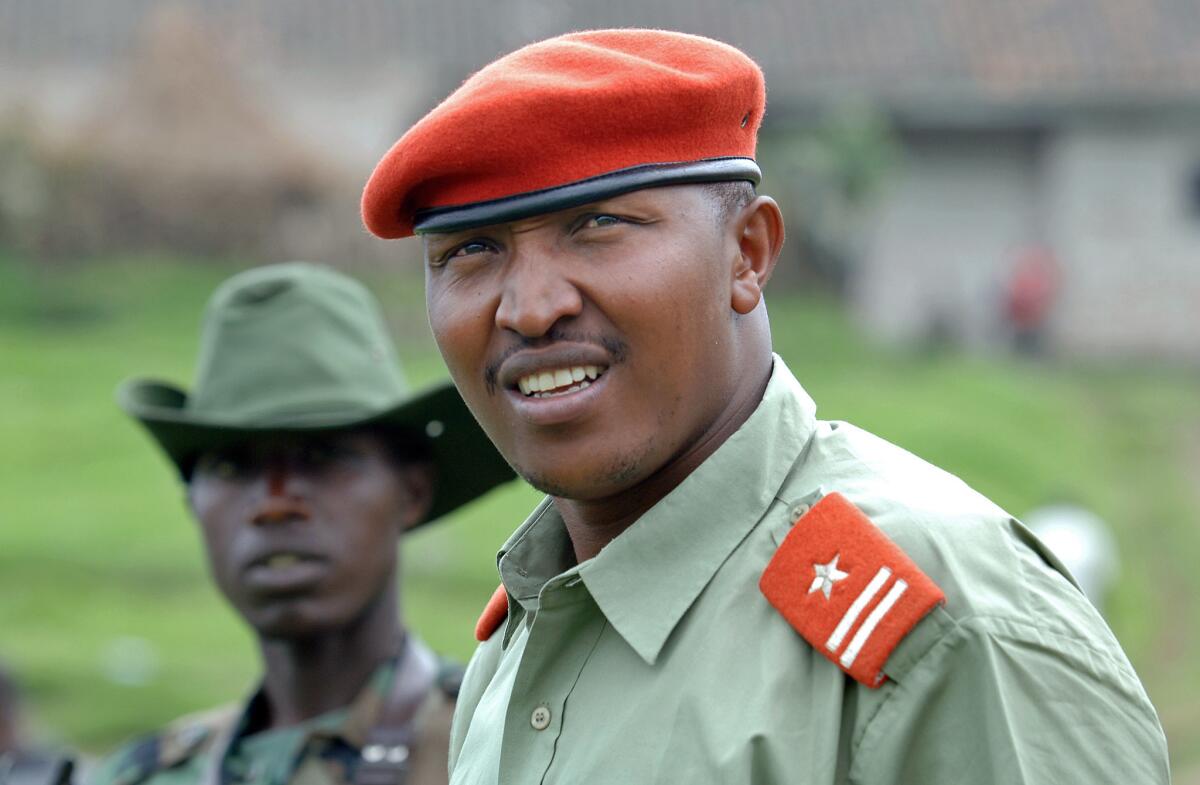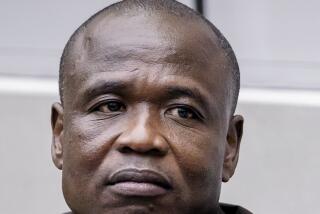Rights groups hail surrender of Congolese warlord Bosco Ntaganda

JOHANNESBURG, South Africa -- In his seven years on the run from international justice, Congolese warlord Bosco Ntaganda became a symbol of the International Criminal Court’s impotence.
Now the court, which lacks a police force to arrest those it has indicted, will have an unexpected opportunity to demonstrate its relevance in Ntaganda’s case.
The warlord-turned-general-turned-warlord, who launched last year’s rebellion in Eastern Congo, shocked everyone when he walked into the U.S. embassy in the Rwandan capital of Kigali on Monday and asked to be handed over to the ICC to stand trial.
Nicknamed “The Terminator” because of his reputation for ruthless bloodletting, and indicted for war crimes including killings, rapes, attacks on civilians, sexual slavery and recruitment of child soldiers, Ntaganda had nevertheless been frequently spotted around Goma, the largest city in eastern Democratic Republic of Congo. He was fond of playing tennis at a well-known lakeside hotel and equally fond of frequenting the best restaurants, according to locals.
He didn’t so much evade arrest as flaunt his freedom. Neither Congolese authorities nor the U.N. force in the Democratic Republic, MONUSCO, arrested him.
His surprise appearance at the embassy was a muted end to a long career fighting for successive rebel movements, during which he was allegedly responsible for many atrocities, including massacres and mass rapes. In one of the worst massacres in Kiwanja, in 2008, 150 people were killed.
The following year, Ntaganda was integrated into the Congolese army as a general, as part of a discredited peace deal. His loyalists allegedly used their power to loot the region’s rich mineral resources, and when the country’s president, Joseph Kabila, tried to rein them in, Ntaganda and others rebelled, forming the rebel group M23.
An embassy official told The Times that Ntaganda remained in the embassy Tuesday, while arrangements were made for his transfer to the ICC at the Hague. U.S. officials, including the ambassador at large on war crimes issues, Stephen Rapp, have confirmed that the embassy will hand him over to the court.
An ICC spokesman, Fadi El Abdallah, said the court was trying to work out the details of Ntaganda’s transfer, but that no details were available.
“It is important that fair proceedings be conducted according to the highest international standards before the ICC judges for truth to be revealed and for the rights of victims as well as the rights of the defense be fully respected,” he said. “The ICC is working with the relevant authorities to ensure his surrender to the ICC as soon as possible.”
Ntaganda’s decision to surrender suggested that he faced more unhappy alternatives than a long ICC trial and potentially years in detention. The M23 group he founded split acrimoniously, with fighting reported in recent weeks. The opposing faction, led by Sultani Makenga, drove Ntaganda’s fighters back, forcing Ntaganda and other loyalists to flee into Rwanda on Sunday.
Ntaganda, who has a long history of killing traitors and critics, appears to have finally run out of friends. If Ntaganda asked for help from Rwanda’s authorities after fleeing Makenga’s forces in eastern DRC, he was out of luck.
The Rwandan government has been accused by United Nations experts and human rights groups of helping arm and command M23, and of sending Rwandan soldiers to fight alongside the force, a claim it denies. Many analysts believe that Ntaganda’s evidence at the ICC about Rwanda’s role in the fighting in eastern DRC could embarrass the Kigali government.
The Rwandan government Tuesday indicated it would neither block nor support Ntaganda’s transfer to the ICC.
“Rwanda has no decision to take in this matter. It is a matter for the United States, who are holding the suspect, the DR Congo, the country whose nationality the suspect holds, and the ICC, by whom the suspect is wanted,” Rwandan Foreign Minister Louise Mushikiwabo told AFP.
Amnesty International’s DRC campaigner, Claire Morclette, said Rwanda had repeatedly denied involvement in eastern DRC, “so it may be interesting to see what information comes out.”
But she said the indictment was related to crimes committed in the Ituri region in 2003, not the many crimes committed later.
“He will not necessarily be investigated for more recent abuses, unless the prosecutor opens new charges. These incidents should be brought to justice, and remedies and reparations should be made available to victims,” Morclette said.
ALSO:
In Brazil, changing times usher in ‘servant problem’
Jesuits like Pope Francis work on the margins of society
More to Read
Start your day right
Sign up for Essential California for news, features and recommendations from the L.A. Times and beyond in your inbox six days a week.
You may occasionally receive promotional content from the Los Angeles Times.






